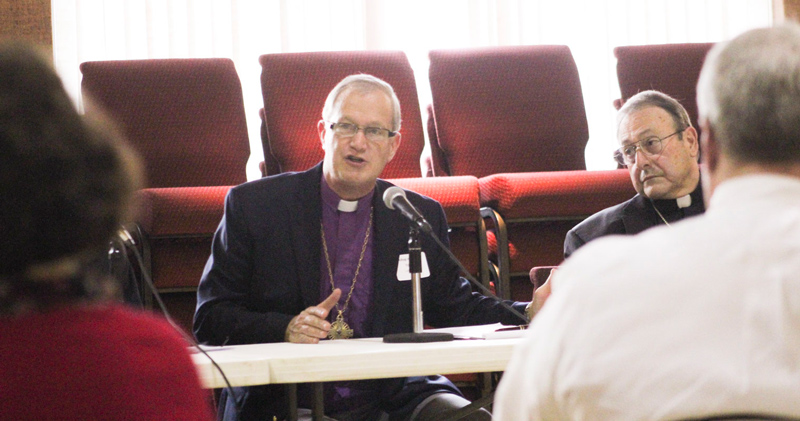
COLUMBIA—State Superintendent of Education Molly Spearman witnessed the disparity between wealthy and poor school districts in South Carolina firsthand several years ago when she was a music teacher.
At one school, she taught in a bright new classroom and her students had access to a wide array of instruments, ranging from guitars to electronic keyboards. A year later, when she took a job in a rural school district near where she grew up in Saluda County, she taught in a battered portable unit with one worn-out upright piano and a record player she brought from home.
The two districts, she said, were only 18 miles apart.
Now, as superintendent, Spearman is challenged to work with the state legislature, educators and local communities to make the playing field more level for all of the districts.

She brought the issue to bishops, clergy and laity from four of the major Christian denominations on Nov. 30 at the annual Lutheran, Anglican, Roman Catholic and United Methodist Bishop’s Dialogue, held at St. Martin’s in the Fields Episcopal Church in Columbia.
Spearman said the need to address inequity is all the more urgent because the state Supreme Court ruled in November 2014 that South Carolina had for decades failed to provide a minimally adequate education for kids in poor districts.
The LARCUM bishops have made public education a priority for the past few years and in April 2014 issued a pastoral letter cementing their denominations’ commitment to supporting public schools statewide.
Spearman said the need to improve education for poor children is drastic because they are being asked to meet ever more challenging academic requirements.
“No longer is it good enough just to have content knowledge — the question now is whether students can take what they know and use it to solve problems, to be creative and to work with other people,” Spearman said. “We are requiring the same achievements for students in small rural districts as we do those in affluent districts, and the fact is, too many of our students are not prepared for success.”
She outlined ongoing efforts to improve leadership at struggling schools, and said in some cases difficult decisions might have to be made, such as consolidating districts or removing staff members who aren’t effective. She also described new legislative efforts to improve achievement, including an initiative called Read to Succeed, which requires students to read at grade level by third grade or face being held back.
Summer reading camps are being established by school districts to help students catch up, but Spearman asked people of faith to provide assistance as well.
She urged the bishops to challenge pastors and congregations to meet with school principals in their neighborhoods to find out what their needs are. Offering after-school homework help, collecting books for school libraries with scant collections and volunteering to tutor or mentor students are just a few things people in the pews can do, she said.

“Help us work toward a successful vision for these children, because education for many of these children is the only thing that will unlock the cycle of poverty,” Spearman said. “For many of these children, their parents love them and are trying, but they need extra help from the schools and extra learning time to succeed.”
Spearman also responded to audience questions about the need to refocus priorities in education. She described how students have been guided toward preparation for four-year college at the expense of career and technical education programs. This resulted in a lack of candidates for technical jobs that are flooding the state job market as more companies move to the area.
In response, she said the state Department of Education is working on developing apprenticeship programs and other initiatives to specifically address that need for workers.
“In some cases, we have focused too much on just the college track,” she said. “The road to success might look a little different for some students. It might include going to a two-year technical school, or preparing for the military. We also need to educate parents that there are many different roads to success for their children.”
Photos by Christina Lee Knauss/Miscellany
Top photo: Bishop Herman R. Yoos of the South Carolina Synod of the Evangelical Lutheran Church in America (left) makes a point while Bishop Robert E. Guglielmone (right) listens during the LARCUM Bishops’ Dialogue.

